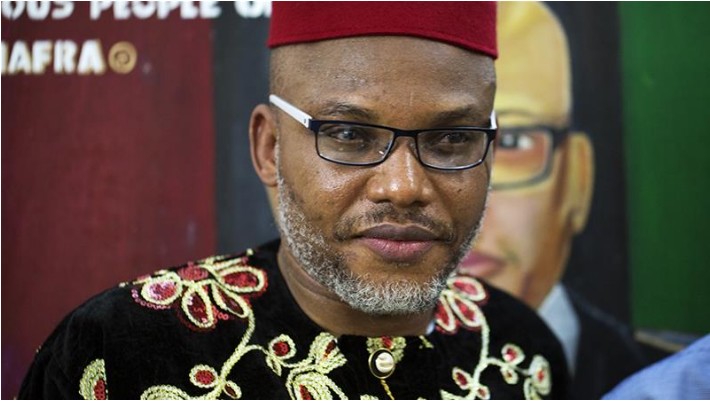
By: Chika Oduah
Umuahia, Nigeria – Nnamdi Kanu waves his hand and puffs in frustration: “Nothing seems to be working in Nigeria. There is pain and hardship everywhere. What we’re fighting [for] is not self-determination for the sake of it. It’s because Nigeria is not functioning and can never function.”
The leader of a group demanding the secession of southeastern Nigeria is speaking exclusively to Al Jazeera in the parlour of his father’s home in the southeastern city of Umuahia.
It’s the first time he has spoken to an international media outlet since he was granted bail on health grounds last month. His bail conditions prohibit him from being in a crowd of more than 10 people, leaving the country and giving media interviews.
But when asked if he is worried that he will get in trouble with the Nigerian authorities for speaking to Al Jazeera he scoffs, “I don’t care,” and rolls his eyes.
“I can’t go outside to call for a press conference. I can’t go on Biafra Radio to broadcast. I can’t allow large [groups of] people to basically congregate outside to see me … it’s like asking me not to breathe,” he says.
On the other side of the parlour door, dozens of people are waiting to see Kanu. A throng of young men dressed in black guard the compound. They refer to Kanu as, “our supreme leader” or “his royal highness”.
Kanu left Nigeria to study economics and politics at the London Metropolitan University and started Radio Biafra, an obscure, niche, London-based radio station in 2009.
In one broadcast, Kanu said: “We have one thing in common, all of us that believe in Biafra, one thing we have in common, a pathological hatred for Nigeria. I cannot begin to put into words how much I hate Nigeria.”
Over the past two years, Kanu’s status has risen.
Today, he’s a highly visible activist and leader of the Indigenous People of Biafra (IPOB) organisation, and after being imprisoned in the Nigerian capital of Abuja for nearly two years on treasonable felony charges, he has now returned home.
“Kanu is my saviour,” says Sopuru Amah, a senior student at one of Nigeria’s oldest universities, the University of Nigeria in the southeastern city of Nsukka.
“Just like Jesus was sent to save the world, Kanu was sent by God himself to save the Igbo people.”
Nigeria’s ethnic politics
With an estimated population of more than 180 million, Nigeria is often called the “giant of Africa”. The complexity of Nigeria’s population is compounded by its ethnic diversity. Around 250 ethnic groups, each with their own languages, reside in Nigeria. With a myriad of







